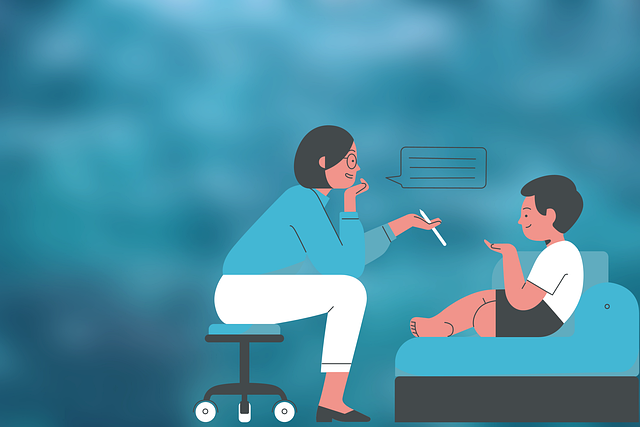Virtual therapy sessions leverage video conferencing to offer flexible, accessible mental health care from home. They eliminate geographical barriers, provide personalized treatment using CBT, mindfulness, and exposure therapy, and are popular for managing depression and anxiety symptoms. This innovative approach benefits individuals with busy schedules, limited mobility, or rural locations, fostering community and encouraging open self-reflection in a safe digital space.
In today’s digital era, virtual therapy sessions offer a convenient and accessible approach to managing depression and anxiety. This article explores the growing trend of online mental health support, delving into its various benefits. From understanding the fundamentals of virtual therapy for depression to uncovering how it effectively combats loneliness, we dissect powerful techniques used in remote sessions. Learn about accessing support from home and measuring success, providing a comprehensive guide to harnessing the power of virtual therapy.
Understanding Virtual Therapy for Depression

Virtual therapy sessions have emerged as a powerful tool in the fight against depression and anxiety. This innovative approach leverages technology to deliver therapeutic support from the comfort of one’s home, breaking down traditional barriers. By using video conferencing platforms, individuals can engage in real-time conversations with licensed therapists, just as they would in a physical office setting. The benefits are numerous: flexibility in scheduling, reduced travel time, and increased accessibility for those in remote areas or with limited mobility.
Moreover, virtual therapy offers a safe and confidential space where individuals can openly discuss their feelings and challenges. Through interactive techniques such as cognitive-behavioral therapy (CBT), mindfulness exercises, and exposure therapy, therapists guide clients towards managing symptoms effectively. The success of virtual therapy lies in its ability to provide personalized care while ensuring ongoing support, making it an increasingly popular choice for those seeking help for depression and anxiety.
Advantages of Online Anxiety Treatment

Virtual therapy sessions offer a range of advantages for individuals seeking treatment for anxiety and depression. One of the key benefits is accessibility; online platforms allow people from diverse locations to connect with therapists, eliminating geographical barriers. This accessibility ensures that those who may face challenges attending in-person sessions due to distance, transportation issues, or personal circumstances can still access much-needed support.
Furthermore, virtual therapy provides a convenient and flexible approach to treatment. Sessions can be scheduled at times that suit the client, fitting into busy schedules without the need for travel time. This flexibility is especially beneficial for those with demanding work or family commitments. Online platforms also offer a safe and private space for individuals to open up and discuss their struggles, fostering a sense of comfort and encouraging honest self-reflection.
How Virtual Sessions Combat Loneliness

Virtual therapy sessions offer a unique opportunity to combat loneliness, a common issue for many individuals dealing with depression and anxiety. Through online platforms, clients can connect with therapists from the comfort of their homes, breaking down geographical barriers. This accessibility fosters a sense of community, allowing users to engage in therapeutic conversations without feeling isolated.
The interactive nature of virtual sessions encourages active participation, creating a supportive environment. Therapists can use various tools and techniques to ensure these online meetings are engaging, much like traditional face-to-face therapy. By providing a consistent and reliable space for connection, virtual therapy challenges the perception of loneliness, offering valuable support and a sense of belonging.
Effective Techniques in Remote Therapy

Virtual therapy sessions have revolutionized the way mental health services are delivered, offering effective techniques for treating depression and anxiety disorders. One of the key advantages is accessibility; individuals can receive therapy from the comfort of their homes, removing geographical barriers and increasing convenience. This remote approach is particularly beneficial for those with limited mobility or living in rural areas, ensuring they have equal access to care.
During these sessions, therapists employ various evidence-based strategies tailored to each patient’s needs. Cognitive Behavioral Therapy (CBT) is a popular method, focusing on identifying and changing negative thought patterns and behaviors associated with depression and anxiety. Other techniques include mindfulness practices, relaxation exercises, and exposure therapy, which helps individuals gradually face their fears in a safe virtual environment. Video conferencing platforms also enable therapists to observe body language and non-verbal cues, enhancing the therapeutic process.
Accessing Support from Home

In today’s digital era, accessing support for mental health issues like depression and anxiety has become more convenient with virtual therapy sessions. These sessions allow individuals to receive professional help from the comfort of their homes, eliminating geographical barriers and making therapy accessible to those who may face challenges attending in-person appointments. Through secure video conferencing platforms, clients can interact with licensed therapists, fostering a safe and supportive environment for open dialogue.
Virtual therapy offers flexibility, enabling individuals to manage their treatment around their daily schedules. This accessibility is especially beneficial for those with limited mobility, busy lifestyles, or who live in remote areas where face-to-face services may be scarce. By embracing technology, virtual therapy sessions empower folks to take charge of their mental well-being and embark on a journey towards improved emotional health right from the comfort of their homes.
Measuring Success and Continuous Care

Measuring success in virtual therapy for depression and anxiety is a nuanced process. Unlike traditional settings, quantifying progress in online therapy requires a different approach. Therapists often rely on self-reported assessments from patients, tracking changes in mood, anxiety levels, and overall functioning through regular check-ins and structured questionnaires. This data provides valuable insights into the effectiveness of virtual therapy sessions, allowing for adjustments to treatment plans as needed.
Continuous care is integral to long-term success. Following initial therapy, ongoing support is crucial to sustain improvements. Virtual platforms facilitate this by offering scheduled follow-up sessions, access to digital resources like mood trackers and educational materials, and sometimes even peer support groups. This comprehensive approach ensures that individuals continue to receive the care they need, even after their formal therapy journey, promoting resilience and well-being in the long run.
